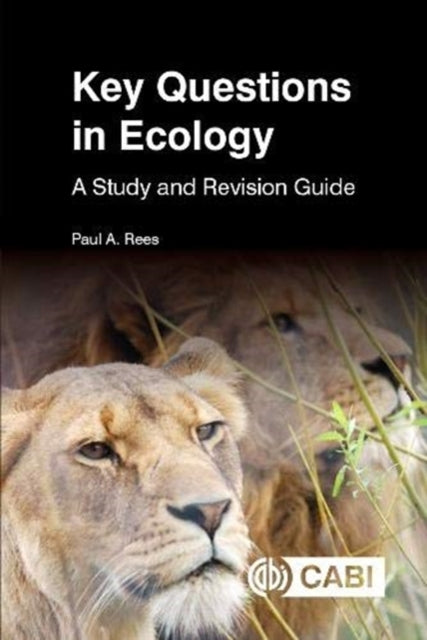Dr PaulRees
Key Questions in Ecology: A Study and Revision Guide
Key Questions in Ecology: A Study and Revision Guide
YOU SAVE £2.28
- Condition: Brand new
- UK Delivery times: Usually arrives within 2 - 3 working days
- UK Shipping: Fee starts at £2.39. Subject to product weight & dimension
Bulk ordering. Want 15 or more copies? Get a personalised quote and bigger discounts. Learn more about bulk orders.
Couldn't load pickup availability
- More about Key Questions in Ecology: A Study and Revision Guide
This book is a study and revision guide for students studying ecology,with 600 multiple-choice questions and answers set at three levels. It covers 10 major topic areas,including the history and foundations of ecology,abiotic factors and environmental monitoring,taxonomy and biodiversity,energy flow and production ecology,nutrient and material cycles,ecophysiology,population ecology,community ecology and species interactions,ecological genetics and evolution,and ecological methods and statistics. The convenient format allows for easy use at any time and place,and the questions require students to interpret information provided in graphs,data,or photographs.
Format: Paperback / softback
Length: 232 pages
Publication date: 03 September 2020
Publisher: CABI Publishing
Ecology is a fundamental concept that permeates various academic disciplines, including biology, zoology, and environmental science. This comprehensive book serves as a study and revision guide for students enrolled in programs that emphasize ecology as an essential component. Comprising an extensive collection of 600 multiple-choice questions (with corresponding answers) spanning three levels—foundation, intermediate, and advanced—the book is organized into ten major topic areas:
The History and Foundations of Ecology: This section delves into the historical development of ecology, exploring the pioneers who laid the foundation for our understanding of ecosystems. It also examines the fundamental principles and theories that underpin ecological research.
Abiotic Factors and Environmental Monitoring: This topic area focuses on the physical and chemical components of the environment, including air, water, soil, and climate. It explores the methods used to monitor and analyze these abiotic factors to assess their impact on ecosystems and organisms.
Taxonomy and Biodiversity: This section explores the classification and identification of living organisms, emphasizing the principles of taxonomy and the diversity of life on Earth. It covers the taxonomic hierarchy, species identification, and the conservation of biodiversity.
Energy Flow and Production Ecology: This topic area examines the flow of energy within ecosystems and the processes that drive the production of organic matter. It explores the role of photosynthesis, respiration, and nutrient cycling in the maintenance of ecosystem health.
Nutrient and Material Cycles: This section delves into the cycling of nutrients and materials within ecosystems, including the processes of decomposition, nutrient uptake, and mineralization. It explores the importance of these cycles in supporting ecosystem productivity and sustainability.
Ecophysiology: This topic area focuses on the physiological processes that occur in living organisms, including respiration, circulation, and energy metabolism. It explores the adaptations of organisms to their environments and the impact of environmental stressors on their physiology.
Population Ecology: This section examines the dynamics of population growth, distribution, and behavior within ecosystems. It explores the factors that influence population size, density, and structure, as well as the interactions between populations and their environments.
Community Ecology and Species Interactions: This topic area explores the structure and function of communities, including the interactions between different species within an ecosystem. It examines the factors that shape community composition, diversity, and stability, as well as the ecological processes that support species interactions.
Ecological Genetics and Evolution: This section explores the genetic mechanisms that drive the evolution of species within ecosystems. It covers the principles of hered
Ecological Methods and Statistics: This topic area introduces the methods and techniques used in ecological research, including field surveys, experimental studies, data analysis, and statistical modeling. It explores the importance of these methods in generating reliable and valid ecological data and in making informed ecological predictions.
The book has been designed with convenience in mind, allowing students to utilize it at any time and in any location. Its user-friendly format facilitates learning and revision of ecological concepts, basic ecosystem processes, population dynamics, ecological genetics, evolution, survey methods, and numerous other essential topics. The book adopts a structured approach, allowing students to study one topic area at a time, gradually progressing from simple questions to more challenging ones. Many of the questions require students to interpret information presented in the form of graphs, data, or photographs, fostering independent study and critical thinking skills.
In conclusion, this comprehensive book serves as an invaluable resource for students seeking to deepen their understanding of ecology and excel in their academic pursuits. With its extensive collection of questions, diverse topic areas, and user-friendly format, it equips students with the knowledge and skills necessary to excel in their ecological studies and contribute to the field of environmental science.
Weight: 512g
Dimension: 156 x 235 x 17 (mm)
ISBN-13: 9781789247572
This item can be found in:
UK and International shipping information
UK and International shipping information
UK Delivery and returns information:
- Delivery within 2 - 3 days when ordering in the UK.
- Shipping fee for UK customers from £2.39. Fully tracked shipping service available.
- Returns policy: Return within 30 days of receipt for full refund.
International deliveries:
Shulph Ink now ships to Australia, Belgium, Canada, France, Germany, Ireland, Italy, India, Luxembourg Saudi Arabia, Singapore, Spain, Netherlands, New Zealand, United Arab Emirates, United States of America.
- Delivery times: within 5 - 10 days for international orders.
- Shipping fee: charges vary for overseas orders. Only tracked services are available for most international orders. Some countries have untracked shipping options.
- Customs charges: If ordering to addresses outside the United Kingdom, you may or may not incur additional customs and duties fees during local delivery.


